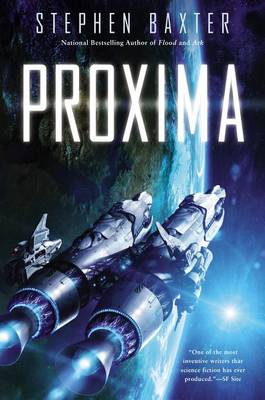Reviewed by littleread1 on
Proxima is very much a classic Sci-Fi novel. Space travel, unknown physics, mysterious items, and AI (Artificial Intelligence) with the best of them. We start off with Yuri, which makes me consider him the main character, however that label is not quite accurate. The story jumps around a lot, with differing points of view, occurring in different years. That made the story kind of hard for me to follow, especially at first. There are, what I consider, 3 main POV's we focus on during the story, with a sprinkle of others here and there. As we get to the climax of the book the multiple POV's over then long time period certainly added a depth and enriched the story, but it really took entirely too long for the story-lines to merge, or even at least become related. Remembering which story line and year you are reading when picking the book back up after a break was a bit of a challenge.
As mentioned earlier, there is a long time period covered in the story, but the jumps seemed a bit random. Seven years here, nearly 20 there, and since the POV's were in different times, the amount of time jumped was also different for each story line. It was hard to keep track of the age of the characters, and how much time had passed, with each jump.
Even with so many differing points of view, you are not in the know about everything. Several events are just alluded to, or mentioned in passing, leaving you to theorize about the cause and the outcome. You are given just enough knowledge to make educated guesses, but very little concrete knowledge. At first I found this very annoying, I like to KNOW things. However as the story progressed I found this a unique tool to keep the story in my mind even when I wasn't reading.
The ending ... it was a pretty large "What the heck just happened? That can't be the end!" moment for me. Very little closure was had; almost the opposite in fact. Proxima ends with a great setting for the sequel. While there is minimal closure, I still wouldn't qualify it is a giant cliffhanger either. By that point in the story you are used to rolling with the punches, much like Yuri, and at the end I just laughed and said to myself, "Yeah, that's about right," and put my kindle down, all the while shaking my head.
Even with the odd time jumps and seemingly random points of view, as I progressed in the story I found myself thinking about it when I was away from the book. Wondering what was going to happen next, how the stories were going to combine, and even occasionally dreaming about the worlds described within the pages. When I first started this story, I thought there was no way I would be interested in the sequel. By the time I got to the end, I realized I was mistaken. I certainly will look into the sequel given the chance.
Reading updates
- Started reading
- 6 October, 2014: Finished reading
- 6 October, 2014: Reviewed
